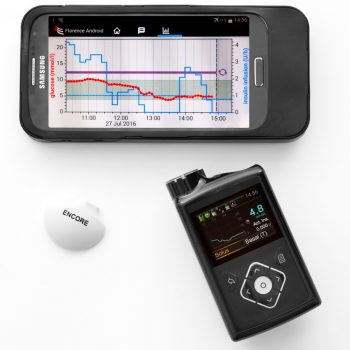NIHR researcher nominated for The Sun’s Who Cares Wins health awards
NIHR-funded researcher Professor Roman Hovorka has been nominated for the Groundbreaking Pioneer or Discovery category of The Sun’s Who Cares Wins health awards for his research developing an artificial pancreas for people with type 1 diabetes.
The Who Cares Wins health awards were launched in memory of the late Sun Health Editor Christina Earle to recognise the selfless medics, researchers and volunteers who work in the NHS. Now in their second year, the awards are this time also marking the 70th anniversary of the NHS.
Prof Hovorka and his colleagues at the NIHR Cambridge Biomedical Research Centre have developed an artificial pancreas hooked up to a smartphone that has the potential to transform management of type 1 diabetes.

Artificial pancreas device
Type 1 diabetes is one of the most common chronic diseases, affecting more than 400,000 people in the UK. People with type 1 diabetes are dependent on insulin injections several times a day to control their blood sugar levels – around 65,000 injections over their lifetime. This regular delivery of insulin is critical to reduce the risk of dangerous fluctuations in blood sugar levels, which can lead to serious complications such as eye, heart and kidney disease.
The artificial pancreas, which was highlighted as one of the 70 discoveries that have transformed NHS in NIHR’s I Am Research campaign, combines a continuous glucose monitor, insulin pump and smartphone. The device monitors blood sugar levels 24/7 to calculate and deliver the correct amount of insulin needed at any particular time. This approach cuts out the need for injections, improves blood sugar control, and reduces the likelihood of risky peaks and troughs in blood sugar levels.
A prototype of the artificial pancreas that Prof Hovorka has developed is currently being trialled in a study funded by the NIHR Health Technology Assessment Programme. The research, taking place across six centres in the UK including the NIHR Cambridge Clinical Research Facility, is recruiting 100 young patients aged 10-16 with type 1 diabetes (the CLOuD Study).
Early results from the trial indicate that the artificial pancreas significantly improves blood sugar control overnight, helping patients to sleep better and perform better during the day. Should the final study results prove positive and the artificial pancreas be adopted into standard care, it will revolutionise treatment for patients with type 1 diabetes.
Prof Hovorka’s artificial pancreas research was one of three entries shortlisted out of thousands for the Groundbreaking Pioneer or Discovery category of The Sun’s awards. Prof Hovorka said: “I am thrilled that our research limits the highs and lows of blood glucose levels in people with type 1 diabetes, allows parents to sleep throughout night and makes life more enjoyable for all involved. I am honoured to have been nominated for the work I and my deeply dedicated team have done.”



